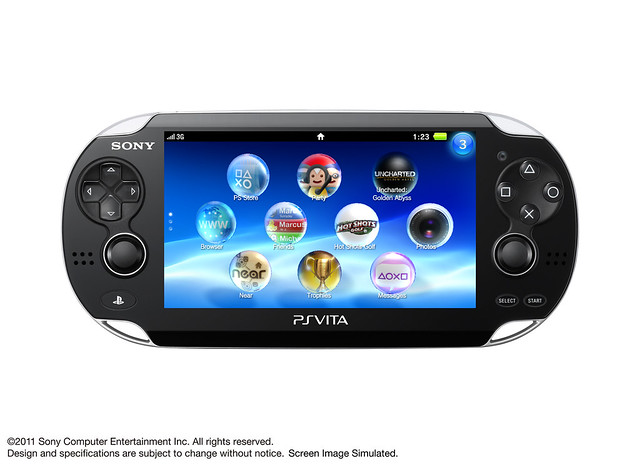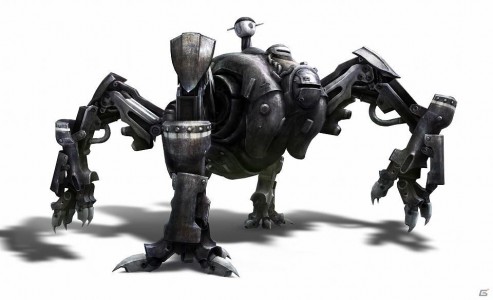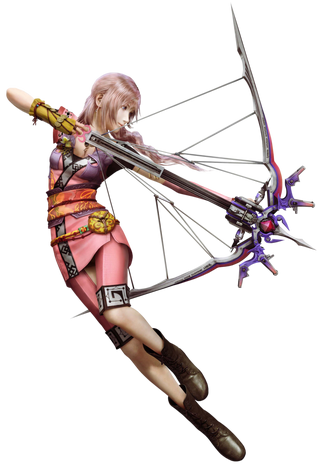I had the opportunity today to stop by a GameStop, and they had a Playstation Vita demo unit on display. From far away, it looked just like a PSP, but when I got closer, I was struck by how
big the handheld is.
It was actually a little off-putting. It may have been the unit that GameStop uses to ensure the Vita isn't stolen but can still be held--it looked to be fastened along the bottom of the Vita and nowhere else--but man, it just looked
bulky. Slick, yes, but rather bulky. I put it alongside my thigh to see how it would fit in my pocket, and it didn't seem very... well, portable.
The screen is beautiful. It's definitely the majority of the handheld's size, but it is worth it: crystal-clear and the touch controls are responsive.
The power and volume buttons are along the top of the unit, and I don't remember if there was anything else on there; I'd have to get another look. The Playstation menu button is located, as you can see in the picture, below the left analogue stick; the start and select buttons are below the right. I'm not a huge fan of the location for the select and start buttons, and they seemed a little hard to click because of the way they're set, but overall the layout is okay. The face buttons and D-pad feel higher up than on a Playstation 3 controller, but I think that just needs a little getting used to.
The analogue sticks feel quite strange to me. They're actual analogue sticks instead of the slide-pad that the Nintendo 3DS has, and they work wonderfully, but they feel a little looser than, say, the Xbox 360 or the PS3. Again, it's probably something I just needed to get used to. However, I disliked the D-pad; it felt really loose, like it would pop up or be unresponsive.
The touchpad on the back was different than I expected; from the look of it on promotional photos, I expected it to be smooth yet matte, but instead it felt the same as touching the front of the device. I tested it out a little bit on
Modnation Racers: Road Trip's track-building mode--you can build terrain with it--but it didn't seem to respond well. At first, it appeared to change what I did depending on the pressure I put on it, but I had trouble getting it to make mountains after the first one I put. Of course, it could just be because it's a demo unit that everyone can use rather than a personal console, so I'll have to reserve judgement until I'm able to get my own.
I tried three games while I was there; I didn't take a long time to do so, unfortunately, because there were others in the store that might have wanted to see it. The demos I played were for
Gravity Rush, Modnation Racers: Road Trip, and
Little Deviants.
Gravity Rush was a ton of fun. I didn't get far into the demo, but the first few minutes of it involve getting used to the controls. It's an anime-styled game in which a cat seems to be able to affect how gravity works for a blonde girl, and players take control of her to fight enemies and walk up buildings. The girl--whose name I didn't pick up during the demo--is able to use her gravity-manipulating powers to jump and kick, as well as jump from building to building. The Vita's gyroscope can be used to change the direction that the protagonist falls, but it wasn't very responsive when I used it; of course, this was a demo and I was just barely familiarizing myself with the controls. Overall, it was a fun game, it looked like something I'd find on the PS2, and it's something I'll definitely buy when I get my own Vita.
I didn't spend much time with
Modnation Racers: Road Trip, and I've never played the original game. The main thing I fiddled about with was the track-building option; users choose a basic template for the background, can draw the shape they want their track to take, and then use the rear touchpad to make terrain around it.
Little Deviants was the last title I tried, and again, I didn't play a lot of it. From what I could glean, it was essentially the Vita's version of
Face Raiders for the Nintendo 3DS. Unlike
Face Raiders, the enemies in
Little Deviants aren't generated from photos taken with the handheld; instead, you see little creatures flying around on rocket ships, being chased by robot enemies. Using the gyroscope inside the Vita, you take aim and then fire at the robots to save the Deviants. It seemed like fun, and using the Vita's outer camera it overlays the Deviants and enemies onto reality, but it's not anything I'd recommend playing full price for.
 |
| Gravity Rush screenshot. Picture from IGN. |
I left with some pretty positive impressions of the Vita. I can't say I like the size of the system--I'd like to be able to take my portables with me in my pocket, and the PSP is just barely small enough to do so--but it feels slightly more comfortable in my hands than my 3DS does, and the display is beautiful. I'm not sold on the rear touchpad; I usually hold my handhelds with my fingers splayed across the back of the unit, and while the Vita has areas for players to put their fingers, but they still weren't as comfortable as my usual style of play, and I feel like I would constantly accidentally hit the touchpad. More exposure to the unit will probably help me shape my opinion better on it.
The game selection thus far, in my opinion, is lackluster.
Uncharted looks like fun, and
Gravity Rush was really fun, but I can't say that
Modnation Racers,
Little Deviants, or many of the other announced titles hold any interest to me. I want
Silent Hill: Book of Memories and
Persona 4: The Golden as well, but most of the games are not things I would play, in contrast to the multiple games for the 3DS I want.
I'm definitely going to have my eye on the Vita... but I can't say it's, at this point, a must-have handheld.
EDIT 2/13/2012: Come to think of it, I forgot to mention something crucial: loading times. The loading times on the demos felt
long. Not anywhere as ridiculous as, say, 30 seconds, but they were definitely noticeable, considering these demos were--as far as I could tell--loaded onto the memory card of the Vita demo unit. Perhaps they will fare better in their retail releases, but even
Gravity Rush, which I want, had frustrating loading times between stages and menus.











